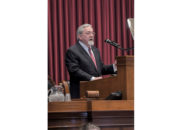JEFFERSON CITY, Mo. — The battle over Medicaid expansion reached the Missouri Supreme Court Tuesday as attorneys for the state and for members of the expansion population outlined their arguments before a packed courtroom.
A Cole County judge ruled in favor of the state’s argument that it had no obligation to expand the program last month, pointing to the language of last year’s Amendment 2 and the lack of a stated funding mechanism. The issue was quickly appealed to the Supreme Court with oral arguments Tuesday.
Attorney Chuck Hatfield argued the case on behalf of the plaintiffs, three mothers who have health conditions that would qualify them under the expansion population. Hatfield said it was the duty of the executive branch to enforce expansion.
“Every provision of the constitution has been approved by a vote of the people at some point in the history of this state. …This court has consistently held that every doubt and ambiguity should be resolved in favor of the will of the people,” Hatfield said. “Here, we ask this court to remind the executive branch that the people, by a vote to amend the constitution, have required the executive branch to enroll our clients in the MO HealthNet program.”
Hatfield said the Department of Social Services (DSS) and the governor would likely comply with the court’s decision, noting the department’s cooperation in getting the case through to the Supreme Court quickly.
But Solicitor General John D. Sauer, on behalf of the state, argued the legislature’s failure to appropriate funds specifically for the expansion population put the topic at an impasse this year.
“If you understand federal Medicaid law and federal regulations, there is no mystery at all about the legislative intent of this,” Sauer said. “This was one of the biggest debates in the history of the General Assembly — at the end of all that, every single one of those attempts to clearly and explicitly fund Medicaid expansion was rejected. If they revisit this again next year or the year after that as long as Amendment 2 is on the books, but as for this legislative session there isn’t a mystery of what the legislature intended.”
While the court gave no indication of a timeline for its decision, Hatfield said he expected a quick ruling.
“We’re thankful that the Missouri Supreme Court agreed to an expedited hearing schedule, as time is certainly of the essence,” Healthcare for Missouri said in a group statement. “More than 275,000 eligible Missourians have been waiting to enroll in and receive benefits under the Medicaid program since July 1st. It’s time to bring this issue to a close and bring clarity to this process.”
Just listened to Mo Supreme Court oral arguments on #Medicaid expansion. Hopeful about a victory upholds voters’ decision and allows healthcare access for low income working people. #moleg @chuckhatfield @BarryAycock @zglmoo
— Jill Schupp (@JillSchupp) July 13, 2021
The hearing came off the back of amicus briefs filed on behalf of both parties in the House of Representatives. House leadership called on the Supreme Court to uphold Cole County Circuit Judge Jon Beetem’s decision in a brief filed last week, arguing the plaintiffs “invite this court to order the political branches, in perhaps unprecedented fashion, to appropriate money.”
House Democrats opposed the filing, with Minority Floor Leader Crystal Quade decrying leadership’s move to take an official stance without a vote. A brief in support of the plaintiffs filed on behalf of Quade and Assistant Minority Floor Leader Richard Brown followed Monday, saying the prior brief “circumvents the Missouri House’s rules and processes, violates the principles of a democratic republic, and should therefore be disregarded.”
Oral arguments ended with just over 30 minutes of discussion. The Missouri Supreme Court will now decide the fate of voter-approved Medicaid Expansion. #moleg https://t.co/fAOYnWnb5F
— State Senator Greg Razer (@SenGregRazer) July 13, 2021
The lawsuit against DSS, Acting Director Jennifer Tidball, and the MO HealthNet Division, among others, was filed in May. It asked the court to find the lack of funding for the expansion unlawful and sought an injunction to allow the plaintiffs and others who would be eligible to enroll and receive the same treatment as those already covered under the program.
Missourians voted to become the 38th state to expand its Medicaid program in August 2020, moving to cover more than 270,000 people who earn less than $18,000 a year. Despite several attempts, the legislature did not approve a dedicated fund before passing its budget.
The expansion was slated to take effect July 1.

Cameron Gerber studied journalism at Lincoln University. Prior to Lincoln, he earned an associate’s degree from State Fair Community College. Cameron is a native of Eldon, Missouri.
Contact Cameron at cameron@themissouritimes.com.
















































